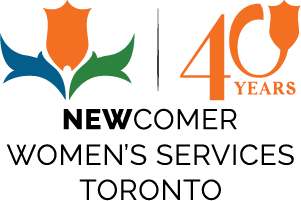A message on anti-Black racism from the Executive Director and Board of Directors
Newcomer Women’s Services Toronto (NEW) stands in solidarity with Black communities across Canada and around the world and recognizes that we need to do better to be a catalyst for change and action against systemic anti-Black racism.
Since 1983, our mission has been to empower newcomer women and their families in building a life in Canada, by connecting them to social and economic opportunities and fostering a sense of belonging. This unique position has allowed us to contribute in many ways to the newcomer experience, but we acknowledge the continued existence of substantial systemic barriers, racial harassment, and racial discrimination, especially towards the Black community. We see the existence of systemic barriers and discrimination in Toronto’s labour market, for example, with an unemployment rate of 13% for Black Torontonians - nearly twice the provincial rate - and 28% for Black youth - twice the national average. Black women continue to earn significantly less than white men and white women - with earning gaps of 37% and 15%, respectively. And Black residents are often in part-time and precarious work that is inadequate to meet basic needs.1
We commit to providing an equitable experience for Black, Indigenous and People of Colour (BIPOC) staff, clients and communities, to ensuring no one is denied access to resources or participation due to anti-Black racism, and to fully leveraging the knowledge, skills, and talents of BIPOC staff and clients. Our board and NEW’s leadership will take action to implement processes and protocols to identify and dismantle systemic barriers and are committed to the following actions:
Diversity & Inclusion Policy: We understand that anti-racism and operating in an anti-oppressive framework starts with the organization’s leadership. While we have always committed to having a board that is representative of the diverse community we serve, we have begun a project to formalize a board diversity and inclusion policy to ensure we are accountable in all aspects of governance.
Awareness Building: We will educate the Executive Director, Board, and staff about the history of racism in Canada and its impacts, as well as the historical contributions of BIPOC Canadians. We will build capacity to recognize and address systemic barriers, racial harassment, racial discrimination, profiling, and stereotyping. This will include regular mandatory training at all levels and a calendar of dates to commemorate and spur action.
Relationship Building: NEW wants to break out of its traditional pipelines for recruitment to reduce affinity bias. We will build new alliances that are more linked to diverse BIPOC communities.
Affinity Seeking: We know BIPOC women staff and clients benefit from the support of those with similar life experience, so we are seeking partnerships to create a mentorship program for our Sister2Sister program, which supports newcomer women to become community leaders as advocates and peer supports for victims of gender violence and domestic abuse. We will also explore potential for mentorship opportunities for clients of our other programs and our staff.
Programming: To address the unique challenges that BIPOC communities face, our employment program will seek out diverse Black communities for job fairs. We will provide more targeted counselling for our Black clients seeking jobs and offer educational opportunities for employers around affinity bias, building awareness of human rights in the recruitment process. We will embed anti-racism training in our workshops for youth to make them aware of systemic racism and provide the tools to develop their resilience and self-advocacy.
Nurturing Culturally Curious Children: Children internalize racial bias between the ages of 2 and 4.2 We are undertaking a review on how our child-minding team can enhance its curriculum around anti-Black racism and multiculturalism generally, including acquisition of books, play-time activities and staff awareness building.
These activities, combined with sustained efforts at growing and diversifying our network of clients, volunteers, donors and staff will form the first steps of NEW’s commitment to anti-racism and to ensuring our BIPOC staff, clients and community members are served equitably. We will provide regular updates on the specific steps we are taking within each of the activities outlined above.
Judy Fantham, Executive Director
Sources
1. Toronto for All: Confronting Anti-Black Racism Initiative Community Conversation Guide, https://www.toronto.ca/wp-content/uploads/2019/04/97d4-community-conversation-guide-participants.pdf;
Statistics Canada, 2016 Census of Population, Statistics Canada Catalogue no. 98-400- X2016211;
National Household Survey, Statistics Canada Catalogue no. 99-012-X2011038. 2011. Statistics Canada;
Working Group of Experts on People of African Descent. Statement to the media by the United Nations’ Working Group of Experts on People of African Descent, on the conclusion of its official visit to Canada, 17-21 October 2016. Office of the United Nations High Commissioner for Human Rights (OHCHR), 2016. Retrieved May 25, 2017: http://www.ohchr.org/EN/NewsEvents/ Pages/DisplayNews.aspx?NewsID=20732&LangID=E.
2. Talking to Children About Racial Bias, Healthy Children,, Ashaunta Anderson, MD, MPH, MSHS, FAAP & Jacqueline Dougé, MD, MPH, FAAP, 25 June 2020: https://www.healthychildren.org/English/healthy-living/emotional-wellness/Building-Resilience/Pages/Talking-to-Children-About-Racial-Bias.aspx
